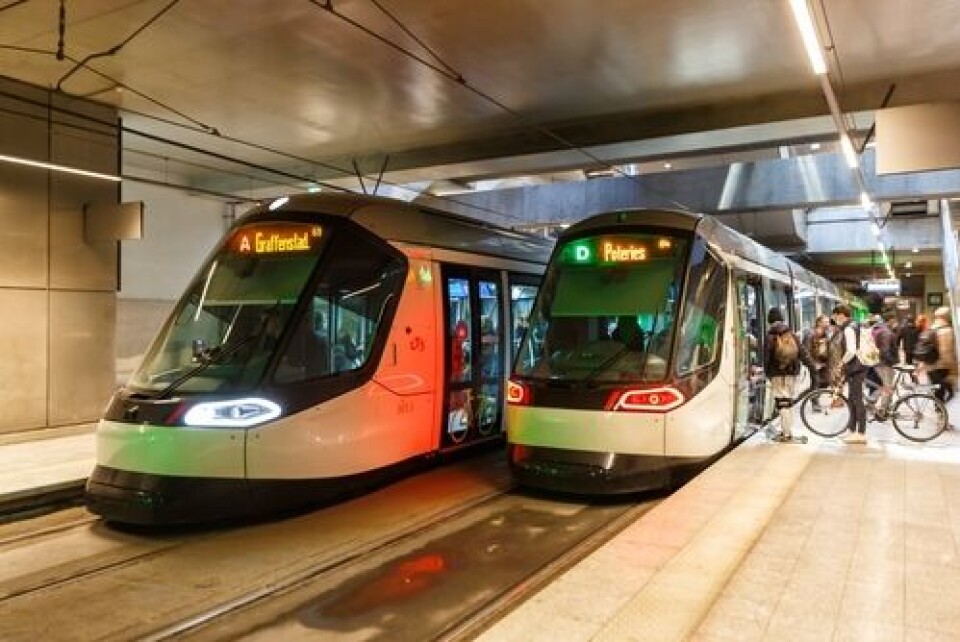-
Occitanie copper phase-out ramps up – how it will affect residents
There are some simple steps you can take to prepare for the switchoff
-
Which cars are stolen the most in France and why?
Perhaps surprisingly, the higher-end vehicles are not the most targeted
-
Several wolf sightings in centre of Frejus, Var
Rules have been relaxed around shooting wolves that threaten livestock
Trains, métro, buses, schools: updates on today’s strike in France
The most severe disruption is across the Paris transport network. Up to 200 demonstrations are expected later across the country

[Update November 10 at 14:05 - The Eiffel Tower is temporarily closed as a result of the strike. The Unsa-RATP union has stated that if its demands are not met it could call a strike to be renewed indefinitely from next week.]
French workers from several different sectors are striking today (November 10), with disruption expected especially within the Paris transport network.
The strike has been called by the CGT union, which is pushing for pay rises and improved working conditions across different industries.
We look at how services are being affected.
Paris transports
The objective in Paris was to have a day of “zero métro, zero RER”, and indeed traffic is completely suspended on five lines today with many stations closed as well.
Lines 2, 8, 10, 11 and 12 of the métro network are completely suspended, and traffic “severely disrupted” on certain other lines as well.
The 3, 3bis, 4, 5, 6, 7, 7bis, 9 and 13 are only running at rush hour – 07:00 until 09:30 and 16:30 until 19:30.
The automatic lines 1 and 14, meanwhile, are operating normally, but are expected to be extremely busy.
On line 1, several stations will also be closed: Reuilly-Didérot, Bastille, Hôtel de Ville, Concorde and Champs-Élysées-Clémenceau.
In terms of RER trains, only one in four will be running during off-peak times on the RER A, and one in two at peak times. For the RER B it will be one in three trains at off-peak times and one in two during rush hour.
“Only two in every three buses will be running on average across the whole of the network, with around 20 lines closed,” operator RATP said in a statement.
Tram circulation will be “almost normal” apart from the T5, which will see significant disruption.
Rail transport
For people travelling on SNCF services, the impact will be limited. This is because all of the unions representing RATP workers have agreed to take part in the strike, whilst for train workers, only the CGT is mobilising.
SNCF has said that trains are circulating as normal on the TGV network, with slight disruptions on Intercités and TER services. Nine in every 10 trains will run normally on the latter.
One region where there will be some disruption is Occitanie, where there will be no trains between Rodez and Brive. Rail replacement buses will be mobilised to help passengers.
Education, healthcare and postal services
Civil servants including teachers, medical professionals and postal workers have also been called to strike today.
“For the five million public sector workers that it is responsible for, the government is satisfied with a general pay rise of 3.5%, well below their needs,” the CGT has said.
The strike is not expected to seriously affect education, healthcare and postal services, but in some regions schools may be impacted.
However, nursery and primary school workers are obliged to declare their intention to strike at least 48 hours in advance, so parents should already know if their child’s class is affected.
Transports in Lyon, Bordeaux, Nice and more
Lyon and Bordeaux have both announced that their local transport networks will not be affected by the strike today.
However, Lyon’s city hall had already stated on Monday (November 7) that tram and bus frequency was to be reduced due to a driver shortage.
In Dijon, public transport has already been affected for several days by strike action. Today, passengers can expect a tram every seven or eight minutes before 19:30 and every 10 or 15 minutes afterwards.
In Strasbourg, trams are also expected to run every seven or eight minutes on the line B and every 10 minutes on the A, C, D, E and F.
Bus line 10 will only run in the direction of Gare Centrale/Gallia/Musée d’Art Moderne/Gare Centrale.
In Nice, there will be no trams running at all, along with around 30 bus lines. The city hall has announced that roadside parking will be free within the urban centre today as a result.
The CGT has confirmed that workers employed by Tam, Montpellier's local public transport operator, have also decided to strike.
Grenoble's tram network is already suspended and certain bus lines are also heavily disrupted as the result of an ongoing movement by workers employed by the local operator TAG.
This industry action is to continue "until further notice".
In Toulouse, public transport is not expected to be affected by the strike, but a demonstration in the city will cause several lines to be diverted or suspended temporarily.
Up to 200 demonstrations across the country
Céline Verzeletti, the CGT’s confederal secretary, has said she expects “150-200 demonstrations” to take place today.
This would result in similar numbers of protesters to October 18, at the height of the French refinery strike, when 300,000 people took part in demonstrations, according to the union.
The police, however, put the number at 107,000.
In Paris, a protest will begin at Place de la République at 14:00, heading for Place de l’Opéra. Further gatherings are expected in cities including Lyon, Marseille, Toulouse and Lille.
Related articles
Rail, schools, métro: What to expect from Thursday’s strike in France
New flights, UK border force strike off: Eight France travel updates
Inflation, interest rates, energy: is France winning on the economy?
























